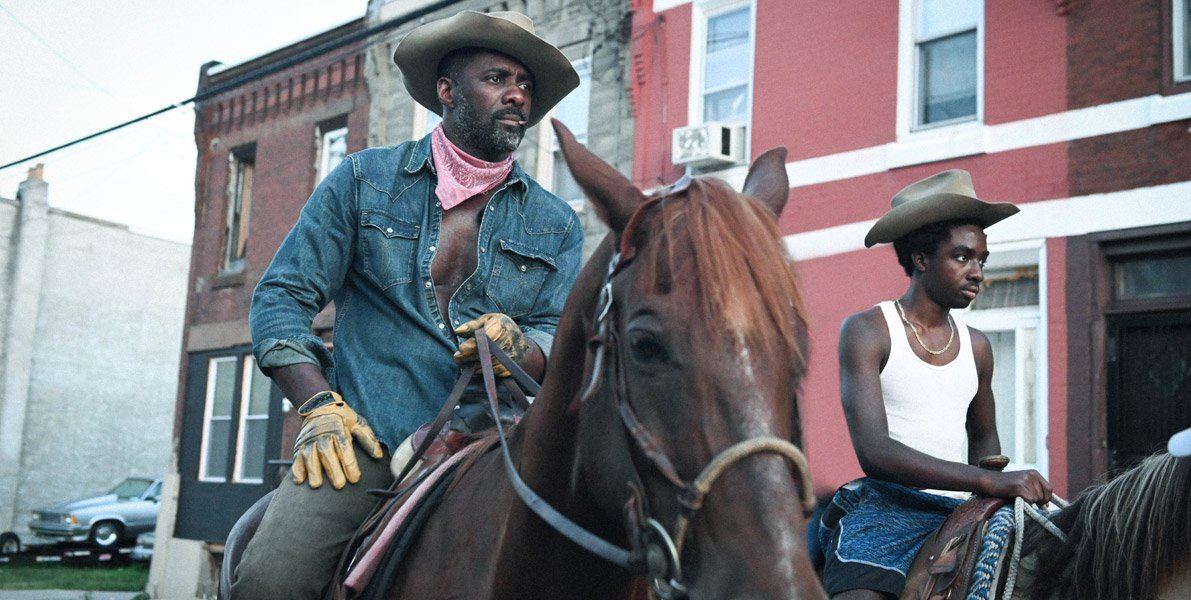Broken down, Ricky Staub’s Concrete Cowboy is more than a little familiar. The various pieces of its plot are stories that audiences have seen on the big screen in the past – from the delinquent kid who is sent away from home as a means of a course correction; to the Black teen who gets seduced by the world of crime; to the adolescent who reconnects with their estranged father. Not seeing the forest for the trees, the idea of all these things being lined up seems like preparation for a parade of tropes and clichés, but that’s a trap the movie successfully avoids. Taking those narrative elements and combining them with inspiration from a real subculture provides them with new depth, and sees the film coalesce as a wonderful coming-of-age tale.
Based on the novel Ghetto Cowboy by Greg Neri, Concrete Cowboy begins as Detroit teenager Cole (Caleb McLaughlin) finds himself on the verge of expulsion following a conflict with a high school classmate. Fed up and not knowing what else to do, his mother (Liz Priestley) makes the decision to pack up all of his stuff and take him to north Philadelphia to stay with his father, Harp (Idris Elba) – who was in prison when Cole was first born, and spends most of his time at a local stable with members of a horse riding club.
Harp’s life isn’t really in a condition to take care of a son, as Cole has to sleep on a couch next to a horse that lives in the living room, and there is nothing in the refrigerator other than beer, soda, and American cheese. What he can do, though, is put the kid to work, and so Cole is employed as a stable hand. It’s hard work, and not incredibly pleasant – and unfortunately not helping the situation at all is the protagonist reconnecting with his childhood friend, Smush (Jharrel Jerome).
Looking for a way out of Philadelphia, Smush is now a drug dealer, and Harp, knowing this, wants his son to stay away from him. This is advice that Cole foolishly doesn’t take, though, and the temperature starts to slowly rise as his pal attempts to start his own criminal venture, and begins getting the attention of some scary individuals.
Concrete Cowboy feels like a patchwork of a variety of other movies, but makes for a unique quilt.
Concrete Cowboy not only pulls a lot narratively from the coming-of-age genre, but also westerns (it will probably come as little surprise to learn that there are threats from the city to shut the stable down, requiring the community to fight back) – but even when you can piece together where the whole thing is going it still draws you in with its specific aesthetic. As many times as we’ve seen these kinds of stories, they feel fresh and presented in a new light here that makes them feel special, and it’s actually compelling to see the way everything properly dovetails.
This is far from the first film that has seen a young rebel learn the value of hard work and responsibility by cleaning stables, or that delves into the lure of crime and gangs for Black teenagers, but seeing these plots explored together is most definitely different, and lends the movie a special flavor.
First time director Ricky Staub shows off some impressive style with Concrete Cowboy.
In bringing together what might otherwise be seen as disparate elements, Ricky Staub deserves great credit, as Concrete Cowboy makes for an impressive feature debut for the filmmaker. While it’s not the easiest genre blend, the script he has co-written with Dan Walser tells an effectively emotional story, and his collaboration with cinematographer Minka Farthing-Kohl has yielded some stunning shots – the best moments being those that unite city and country in beauty (like a child watching and grinning gleefully as a majestic horse runs past while he is on the bus with his mom).
Idris Elba, Caleb McLaughlin, and Jharrel Jerome all deliver great performances, as do the real Fletcher Street Riders.
Lending wonderful authenticity to the film is the fact that Concrete Cowboy features a number of real Philadelphia riding club members in its cast, and they wind up delivering some of the best and most impactful performances in the ensemble – the standout being Jamil Prattis as Paris, who winds up with the key role of being the one who shows Cole the ropes in the stable. As for the “stars,” Caleb McLaughlin delivers a strong, emotional lead performance that demonstrates some exciting range (the character couldn’t be more different than Lucas Sinclair on Stranger Things), and Jharrel Jerome does some fantastic, nuanced work, as he makes Smush far from your typical bad influence and rounds him out as a sympathetic, three dimensional character.
Not being a practiced father, and having the tendency to keep Cole at an arm’s length, Harp’s presence in the film isn’t terrifically constant in the movie, which results in Idris Elba not having the amount of screen time you may expect going in – but he also happens to be an actor who doesn’t need a constant presence to make a major impact, and Concrete Cowboy proves it. When Harp does start to embrace his paternal side, he brings a powerful dose of gravitas and emotion, the turning point being a fantastic scene where he shares the music of John Coltrane with his son.
Concrete Cowboy is a movie that has something to say about passion, connection, respect, and family, and while it has a mostly traditional way about getting those messages across, the 30 percent that makes it stand out as unique counts for a lot. It’s heartfelt and striking filmmaking, and while highlighting an amazing tradition it has the potential to make a wonderful impact.

Eric Eisenberg is the Assistant Managing Editor at CinemaBlend. After graduating Boston University and earning a bachelor’s degree in journalism, he took a part-time job as a staff writer for CinemaBlend, and after six months was offered the opportunity to move to Los Angeles and take on a newly created West Coast Editor position. Over a decade later, he's continuing to advance his interests and expertise. In addition to conducting filmmaker interviews and contributing to the news and feature content of the site, Eric also oversees the Movie Reviews section, writes the the weekend box office report (published Sundays), and is the site's resident Stephen King expert. He has two King-related columns.











